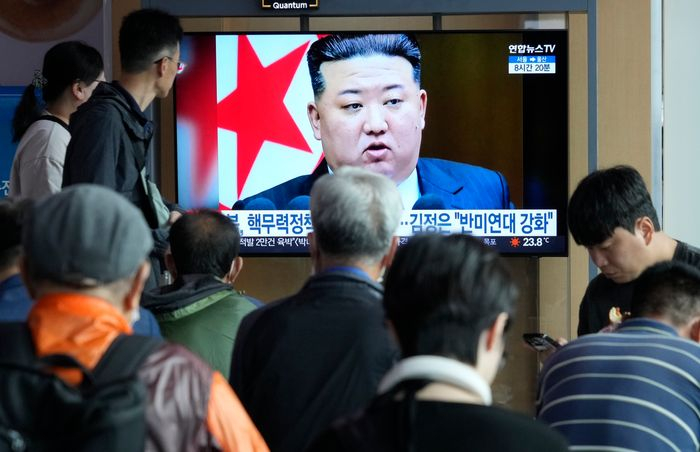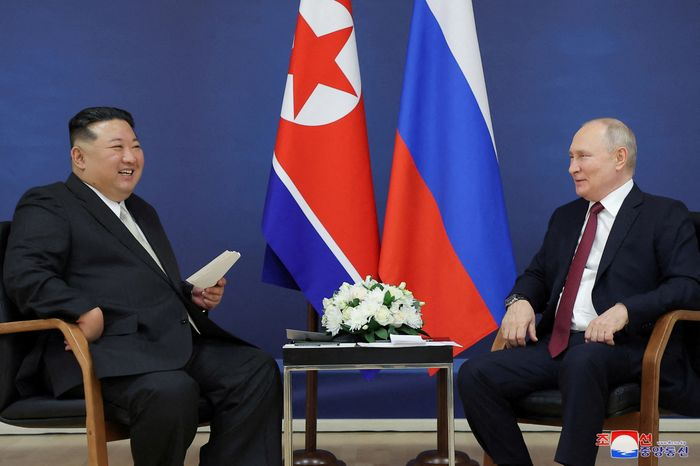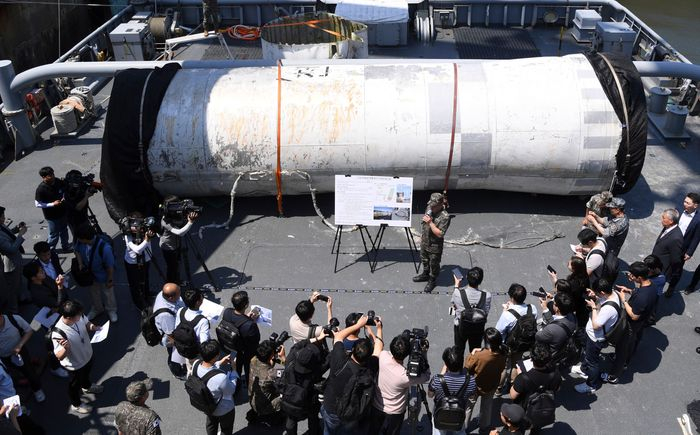North Korea
North Korea Launches Suspected Spy Satellite After Two Botched Tries
Satellite launches represent a core pursuit of deepening military coordination between North Korea and Russia
By The Wall Street Journal Nov 22, 2023 (Gmt+09:00)
4
Min read
Most Read
LG Chem to sell water filter business to Glenwood PE for $692 million


KT&G eyes overseas M&A after rejecting activist fund's offer


Kyobo Life poised to buy Japan’s SBI Group-owned savings bank


StockX in merger talks with Naver’s online reseller Kream


Meritz backs half of ex-manager’s $210 mn hedge fund



SEOUL—North Korea appeared to launch its homegrown spy satellite late Tuesday, South Korea’s military said, a much-anticipated attempt after two tries earlier this year exploded midflight.
The satellite was launched southward around 10:43 p.m. local time from the North’s Tongchang-ri area where its main satellite launch site is located, South Korea’s military said. No further details were provided. It isn’t clear if the launch succeeded.
Japan issued an evacuation order for residents of its southern islands and said a missile passed over the region heading toward the Pacific Ocean around 10:55 p.m. local time on Tuesday. It lifted the evacuation order about 20 minutes later.
North Korea had earlier alerted Japanese authorities that a satellite launch could occur in a 10-day window that began Wednesday local time. Pyongyang didn’t have immediate comment on the satellite launch.
The Kim Jong Un regime has been eager to operate spy satellites, which it considers essential to countering military threats from the U.S. and its allies. Pyongyang lacks such technology currently.
The launch has drawn extra attention because satellites represent a core pursuit of the deepening military coordination between North Korea and Russia. In September, Kim, the 39-year-old dictator, met Russian President Vladimir Putin at Russia’s main spaceport. Putin at the time promised assistance for North Korea’s satellite endeavors.

U.S. and South Korean officials have said that North Korea has been supplying weapons to Russia for its war efforts in Ukraine—a claim that Moscow and Pyongyang have dismissed as baseless.
North Korea has conducted more than 20 weapons tests this year, though none since Sept. 13. Pyongyang has test-fired its next-generation intercontinental ballistic missile, which has the range to strike the U.S. mainland, as well as cruise missiles launched from a submarine.
United Nations Security Council resolutions ban North Korea from any satellite launches because they are seen as a cover for testing ballistic missiles. But Pyongyang has continued to emphasize the need for a military-surveillance system in space. The U.N. has failed to impose additional sanctions due to opposition from North Korea’s allies, China and Russia, which hold veto powers.
Pyongyang failed to launch its spy satellite into space twice this year. During the first attempt in May, North Korean state media cited a malfunction in the second stage of the rocket launch. The follow-up attempt in August faltered because of an error in the rocket’s emergency blasting system, state media said.
North Korea had vowed to make a third attempt in October. The timing was likely delayed due to North Korea examining the space-launch vehicle’s engine and receiving some technical assistance from Russia, South Korea’s spy agency told lawmakers on Nov. 1.

There has been a long history of Russia supplying hardware, know-how and experts to North Korea for its weapons program. That includes what Pyongyang called “Earth-observation satellites” launched in 2012 and 2016. In recent months, Moscow and Pyongyang have been more public about military cooperation, and Russia may have stepped in for the recent launch, said Markus Schiller, a missile expert at consulting firm ST Analytics.
“Usually rockets fail for mundane reasons, and Russia could have implemented some processes for quality management because they’ve been flying to space for a long time,” Schiller said.
Russia’s deputy prime minister said in April that Moscow had 192 satellites of all kinds in orbit, according to Russian news agency Interfax.
Any significant North Korean progress from cooperation with Russia on military-satellite technology would take at least a year to materialize, said Yang Uk, a military expert at the Asan Institute for Policy Studies, a think tank in Seoul. For the Tuesday test, Russia may have used launch data it had accumulated over the years on the separation process and configurations to help North Korea pinpoint the prior causes of failure, he added.
“Russia’s involvement would help accelerate putting North Korea’s spy satellite into space, saving them time and money,” Yang said.
Kim unveiled a five-year weapons strategy in 2021, declaring spy satellites as a priority alongside nuclear submarines and solid-fuel ICBMs. Last week, Pyongyang conducted static tests of a new solid-fuel engine, North Korean state media reported.
- Alastair Gale contributed to this article.
Write to Dasl Yoon at dasl.yoon@wsj.com
More to Read
-

-
 EconomySouth Korea to boost aid for chipmakers to $23 billion, expanding extra budget
EconomySouth Korea to boost aid for chipmakers to $23 billion, expanding extra budgetApr 16, 2025 (Gmt+09:00)
-
 AutomobilesSouth Korea announces emergency support for auto sector against US tariffs
AutomobilesSouth Korea announces emergency support for auto sector against US tariffsApr 09, 2025 (Gmt+09:00)
-
 EconomyChina says it is aiming to coordinate tariff response with Japan, South Korea
EconomyChina says it is aiming to coordinate tariff response with Japan, South KoreaApr 02, 2025 (Gmt+09:00)
-

Comment 0
LOG IN


